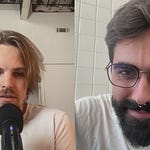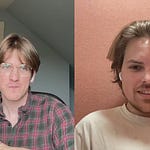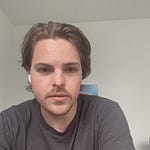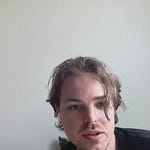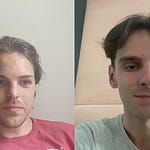In this episode of Unblocked! I talk to Yash, who feels stuck despite his app making $12,000/month. He's finding himself distracted during coding sessions and feeling disconnected from his work.
Highlights
Notes: These highlights are AI-edited and sometimes edit me to sound like Dave Ramsey lol. But I’m adding it here for the convenience of my friends who don’t listen to podcasts — you know who you are.
The Problem: Success Without Direction
Yash: I work on this app called Sparkle. It's a Mac app that helps you organize files on your desktop. I've been working on this for five to six months. It's doing great—we make money. But I'm feeling blocked in terms of what's next.
For the first time, I'm working on a product which is making money, and I'm still feeling kind of lost, which is really weird. I've started feeling this disconnect. I find myself distracted during longer work sessions. Earlier I could work for hours without touching my phone. But now I tend to distract myself when I get stuck.
Andrew: Right now you have this app—does it need consistent maintenance or is it on autopilot?
Yash: It's on autopilot. We're trying to figure out how to take it to the next level.
Daily Routine: Coding and Distractions
Andrew: Walk me through your day. What time do you wake up?
Yash: 6:30. I take a shower, come to our Brooklyn office around 7:30 or 8. It's a collective—five or six people work on their own projects. I work alone on Sparkle.
Andrew: From 8 to 12, how many times will you open Twitter, email, Discord?
Yash: Discord quite a bit. I've been finding the need to distract myself. For example, I'm using Claude Code a lot, and when it's generating code, I have time to kill.
Andrew: What do you do during that time?
Yash: Mostly YouTube. I watch interviews of actors about how they prepared for roles, or directors talking about their process. I value the part where someone's talking about the process of how they created something.
The Core Problem: Work Became Too Easy
Andrew: What do you like more—learning how experts do things on YouTube or coding?
Yash: I like coding more, but I haven't worked on a really complex technical challenge. A lot of tasks are UI or front-end related. Claude can do 95% of that. So I have this headspace that's completely free. I can do more tasks, but I find that distracting.
Andrew: So you like coding in theory, but find it boring in practice because your strategy is too easy—not stimulating enough.
Yash: Yeah, exactly. It's not stimulating enough.
The Business: $12K/Month from Desktop Organization
Andrew: Why do people pay you $12,000 a month?
Yash: We have monthly subscriptions at $10/month and lifetime at $129. People pay us to have an organized desktop without clutter. When you're on calls, you see desktops with 10,000 files. Most are irrelevant. People don't want to manually organize. The pitch is: use AI to categorize your files and live clutter-free.
Andrew: So they keep paying because the mess bothers them?
Yash: Yeah, the mess bothers them. It's good to have an organized folder system without actually doing it.
The Strategic Dilemma: Organization vs Search
Yash: Most of our audience is tech Twitter—people really picky about apps and tools. I sent out an email asking what else to work on. Search came up as a big problem on Mac. So I'm at this crossroad: do organization better, or work on search? That's my main blocker—which path to choose.
Andrew: Is the app growing or steady?
Yash: It's steady. We haven't done much to grow it. We're trying to figure out the right product strategy before doubling down.
The Solution: Talk to Customers, Not Code
Andrew: My instinct is there's no reason to add more features unless you've addressed the entire market. How many users do you have total?
Yash: About 12,000 total.
Andrew: And how many people have Macs?
Yash: I'm assuming 80 to 100 million.
Andrew: So what percentage of the market have you addressed? If you care about consumers, your schedule should look less like "I code and watch YouTube" and more like "I have massive blocks talking to customers." The thing that makes a consumer founder successful is someone who genuinely cares more than everyone else about their customer's success and happiness. What it means to care about your customers is to love them. And to love them means to talk to them.
Customer Feedback: Good But Not Good Enough
Yash: I did 10 customer calls a month back. What I realized is Sparkle does it well, but not well enough. Organization is really personal. People say it works, but it really doesn't—that's a weird spot to be in.
Andrew: When they say it doesn't do it well enough, what do they mean?
Yash: It's not customized or personalized. It has a standardized approach. People want classification based on projects, different bank accounts. Every person's organization structure is different.
Andrew: Does every customer have this personalization problem?
Yash: I'd say 50-50. About 50% do.
The Real Market: Average Users, Not Power Users
Andrew: I think you don't need features. The fact that 50% of customers love it as is—go find those people. Your customers aren't just people who pay you—it's anyone who can't stand their cluttered computer. You should care about Mac users who are frustrated by their computer.
Yash: When I skip to the growth part, maybe this is something I feel internally isn't good enough to grow. That's why I feel that restraint.
Andrew: That's where the unblocking needs to come in. You're living mostly isolated, coding and watching YouTube. That's not right if you want to make people's lives dramatically better. You have to surround yourself with those people.
Finding the Right Audience
Andrew: Whose life do you really want to improve?
Yash: Productivity enthusiasts who care about workflow, saving time, being more productive. They give good feedback.
Andrew: Productivity enthusiasts are the hardest market to sell to. Your product has to be the single best because they know all the options. The market is primarily people who aren't enthusiasts—people overwhelmed and frustrated who don't have tools.
Yash: I do care about them. It's about understanding user insights.
Andrew: So you care about the average Mac user. How many average Mac users have you talked to? Most people aren't on Twitter. You get power users through Every, but you'll never get average users that way.
The Path Forward: Stories and Community
Andrew: There's a story here. People love stories. The story needs to be told to people likely to be average Mac users who care about decluttering and organization, but they're non-technical. There are subreddits for this, TikTok accounts. Post on cleaning subreddits, decluttering subreddits. Don't try to sell—be honest and vulnerable.
Yash: 100%. I think what I'll take from this call is: whose lives do you really want to improve? Focus on that and let other things fall into place.
Andrew: The work shouldn't feel like work. It should feel like play.
Yash: Exactly. Yeah, I'll try these things and write back to you. Thank you so much, Andrew. This was great.





